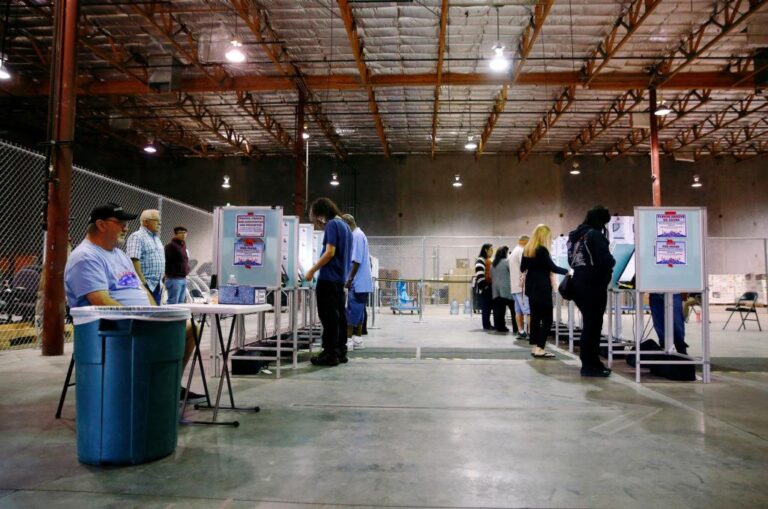Enhancing Election Security to Prevent Potential Disruptions
With rising apprehensions about possible disturbances during forthcoming elections, numerous states across the United States are intensifying their security protocols to protect polling sites and essential election infrastructure. These measures encompass a broad spectrum of actions, including the augmented presence of law enforcement personnel, upgraded surveillance systems, and close collaboration with federal agencies to swiftly manage any incidents. Officials stress the critical need to uphold a calm and secure voting atmosphere, ensuring that every eligible voter can participate without fear or interference.
Prominent security strategies being deployed nationwide include:
- Enhanced on-site protection: Installation of physical barriers, regulated access points, and increased National Guard involvement.
- Robust cybersecurity measures: Safeguarding voter databases and election technology from cyberattacks.
- Community engagement initiatives: Educating voters on safety procedures and promoting peaceful participation.
| State | Implemented Security Actions | Anticipated Benefits |
|---|---|---|
| Georgia | Deployment of National Guard; establishment of voter support hotline | Faster incident response and voter assistance |
| Michigan | Advanced cyber defense systems; installation of surveillance cameras | Heightened protection against hacking attempts |
| Arizona | Expanded police patrols; community informational sessions | Boosted voter confidence and enhanced safety |
Collaborative Law Enforcement Efforts to Secure Polling Places
In light of increasing concerns about election-related violence, law enforcement agencies at federal, state, and local levels have united to strengthen security around voting venues. This partnership involves intensified patrols, deployment of specialized security units, and real-time intelligence sharing to promptly counteract emerging threats. Officials highlight that a visible and strategic security presence is vital to reassure voters and deter any disruptive conduct, all while respecting the democratic process.
Core components of these coordinated security efforts include:
- Joint operations among federal,state,and municipal law enforcement bodies
- Creation of secure interaction channels for rapid incident response
- Specialized training for officers focusing on de-escalation in election-related scenarios
- Strategic deployment of surveillance technology in vulnerable locations
| Agency | Primary Function | Focus Area |
|---|---|---|
| Federal Bureau of Investigation (FBI) | Intelligence gathering and investigation | Identification of potential threats |
| State Police | Patrolling and law enforcement | Securing polling locations |
| Local Police Departments | Community liaison and crowd control | Managing voter interactions and safety |
| Election Commissions | Coordination and oversight | Logistical and operational support |
Advancements in Election Cybersecurity to Counter Digital Threats
Election officials nationwide are accelerating the adoption of cutting-edge cybersecurity technologies to defend voting systems from digital interference.These enhancements include multi-factor authentication protocols, AI-driven anomaly detection, and reinforced firewall protections for election databases. Such proactive measures are designed to maintain the integrity of electronic voting and result tabulation, thereby bolstering public confidence amid a climate of heightened political tension and cyber threats.
Highlighted technological upgrades include:
- Real-time Monitoring: Utilizing artificial intelligence to promptly identify irregularities in voter data and system access.
- Secure Communication: Employing end-to-end encryption to protect data transmission between polling sites and central servers.
- Redundancy and Backup: Implementing offline ballot verification and backup servers to ensure continuity in case of cyber disruptions.
- Staff Training: Providing election workers with education on cybersecurity best practices and incident response protocols.
| Technology | Function | Deployment Status |
|---|---|---|
| AI-Powered Anomaly Detection | Flagging suspicious activities | Active in 15 states |
| End-to-End Encryption | Securing vote data transmission | Nationwide rollout underway |
| Offline Backup Systems | Manual verification of results | Operational in 10 states |
Engaging Communities to Foster Election Confidence and Safety
To reinforce the integrity of the electoral process, state officials are implementing extensive community engagement programs that extend beyond physical security. These initiatives aim to rebuild voter trust through transparent communication and inclusive outreach.Collaboration with local leaders,advocacy organizations,and law enforcement ensures that voters receive accurate data and feel secure when casting their ballots. Efforts include hosting public forums to explain security measures and distributing multilingual resources to accommodate diverse populations.
Digital outreach also plays a pivotal role, with social media campaigns and official websites actively combating misinformation that could incite unrest.Educational content highlights the resilience of election systems and the safeguards in place to prevent interference. Below is a summary of community-focused strategies adopted by select states:
| State | Community Engagement Approach | Security Enhancement | Voter Communication |
|---|---|---|---|
| Michigan | Partnerships with faith-based and civic organizations | Expanded surveillance at polling sites | Weekly election safety bulletins |
| Arizona | Collaboration with local media outlets | Deployment of rapid response teams | Multilingual voter assistance hotlines |
| Pennsylvania | Public town halls and Q&A sessions | Use of self-reliant election observers | Interactive online tutorials on voting procedures |
Conclusion: Key Insights on Election Security Efforts
As the nation approaches election day, the comprehensive security enhancements implemented by various states underscore the urgency to address potential unrest and protect the democratic process. Authorities are carefully balancing the imperative of public safety with the fundamental right to vote,navigating a politically charged environment marked by division. These proactive measures not only aim to deter violence and interference but also to reassure voters of the integrity and fairness of the electoral system. Observers and citizens alike will be closely monitoring how these strategies influence the conduct and outcomes of the upcoming elections.




